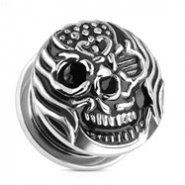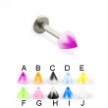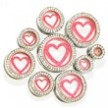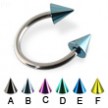Pair Of Fire Skull Surgical Steel Screw Fit Plugs
- Length: 1/4" (6mm)
- Material: 316L surgical grade stainless steel
- Type: plug
- -: priced and sold in pairs
| Click on the picture to see a big picture and description of the body jewelry you are interested in. | |||||||||
|---|---|---|---|---|---|---|---|---|---|
|
Flower cone labret, 14 ga
$2.80
Flower cone labret, 14 ga
Shown: 10mm labret. |
Pair of Steel Tunnels with Pink...
$12.98
Pair of Steel Tunnels with Pink Glitter Heart
|
Pot Leaf with Green Paved Gems...
$6.00
Pot Leaf with Green Paved Gems Dangle Surgical Steel Navel Ring
|
Colored cone circular barbell, 14 ga
$8.49
Colored cone circular barbell, 14 ga
|
||||||
Hardwoods
Hardwoods are most often used to make plugs for enlarged piercings, such as ear lobe, labret, and septum piercings. Hardwoods are natural materials that work in harmony with the body. They can “breathe” with a piercing and allows an interchange of oils. Wood stays warmer than metals. Wood does not develop the bad odor plastics can develop.
Hardwoods are broad-leafed, deciduous trees (angiospermous). The term “hardwood” does not actually refer to hardness: for example, balsa is a hardwood. The part of the tree normally used is the center heartwood, normally darker and denser than the surrounding sapwood.
A few species of wood commonly used for jewelry, furniture and inlays are endangered or threatened. These species are regulated by CITES, the Center for International Trade of Endangered Species. Endangered species include Brazilian rosewood (Dalbergia nigra). Threatened species include Mexican mahogany (Swietenia humilis) and Carribean mahogany (Swietenia mahagoni), Commoner (Guaiacum officinale), and Holywood lignum vitae aka “Tree of Life” (Guaiacum sanctum), Bigleaf mahogany (Swietenia macrophylla), and American mahogany (Swietenia meliaceae). In some cases, wood from threatened species is acquired by salvage or through sustainable harvesting.
Grain (fibers within the wood) is considered either open or closed. Open-grained woods may collect bacteria, shed skin tissue, and dirt and hence generally should not be used for jewelry.
The overall shape and dimensions of the piece should be consistent and appropriate for the particular piercing with room to allow for possible swelling. The finish should be free from scratches, pits or tool marks. The piece should be free of raised grain (wood fibers), even when wet. Luster varies from species to species and the wood may or may not shine. An oiled plug will appear dull.
Because hardwoods are porous and readily absorb and release moisture, oil, and bacteria, hardwood plugs are best worn in healed piercings and dry areas of the body. Because hardwood jewelry cannot be sterilized it should always be handled by clean hands and only worn by one person. Autoclaving hardwood jewelry may cause it to crack, split, and warp. Hardwood jewelry should be cleaned regularly with a non-chemical soap that is safe for the body. Tea Tree oil can also be used; prior to use a patch test is recommended to test for allergy. Hardwood jewelry should be oiled after cleaning to benefit the skin and aid insertion.
The type of finish applied is usually an oil and sometimes a sealant. Many finishing oils and sealing products contain chemicals, toxins, solvents, petroleum or animal products, or pigments. Using a finish that entirely seals a hardwood plug eliminates the purpose of wearing wood. I usually recommend a non-toxic oil or wax. Food grade oils such as olive and peanut are generally safe but may break down (turn rancid) with heat and time; pieces finished using food grade oils should be washed and re-oiled periodically to avoid turning rancid. Waxes can be animal or vegetable based; waxes may come off with heat or be rubbed off while cleaning. I do not recommend using pigment as most are chemical or solvent based and can fade or enter the bloodstream.
Some people are allergic to certain hardwoods. A sensitivity to hardwoods can also be acquired with exposure. The risk of developing a sensitivity to certain hardwoods is increased for those who work with the woods by way of the dust which is produced in the production process. The hardwoods likely to cause allergic reactions include all woods within the Dalbergia genera, or the rosewoods: African blackwood (Dalbergia melanoxylon), Brazilian rosewood (Dalbergia nigra), Cocobolo (Dalbergia retusa), Indian rosewood, aka Bombay blackwood (Dalbergia latifolia), Kingwood aka Violetwood (Dalbergia cearensis), Tulipwood (Dalbergia frutescus), Teak (Tectona grandis), Purpleheart aka Amaranth (Peltogyne spp.); and possibly Greenheart and Satinwood (Chloroxylon swietenia). Some woods may be very hard to identify; for example, African blackwood can masquerade as ebony.




